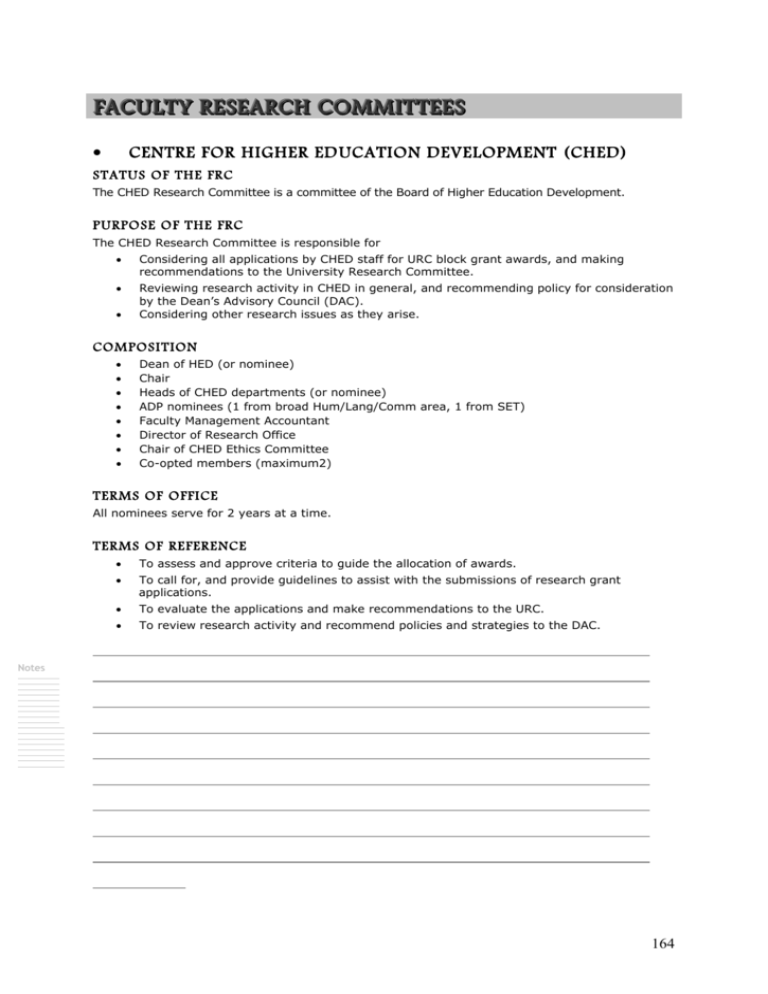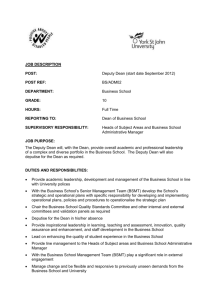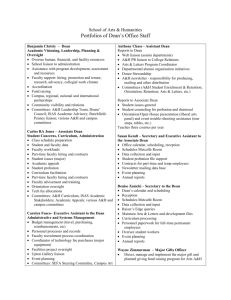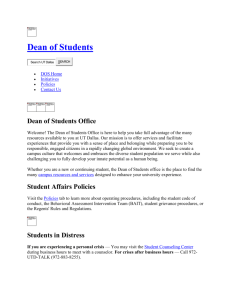FACULTY RESEARCH COMMITTEES
advertisement

FFAAC CU ULLTTYY RREESSEEAARRC CH HC CO OM MM MIITTTTEEEESS CENTRE FOR HIGHER EDUCATION DEVELOPMENT (CHED) STATUS OF THE FRC The CHED Research Committee is a committee of the Board of Higher Education Development. PURPOSE OF THE FRC The CHED Research Committee is responsible for Considering all applications by CHED staff for URC block grant awards, and making recommendations to the University Research Committee. Reviewing research activity in CHED in general, and recommending policy for consideration by the Dean’s Advisory Council (DAC). Considering other research issues as they arise. COMPOSITION Dean of HED (or nominee) Chair Heads of CHED departments (or nominee) ADP nominees (1 from broad Hum/Lang/Comm area, 1 from SET) Faculty Management Accountant Director of Research Office Chair of CHED Ethics Committee Co-opted members (maximum2) TERMS OF OFFICE All nominees serve for 2 years at a time. TERMS OF REFERENCE To assess and approve criteria to guide the allocation of awards. To call for, and provide guidelines to assist with the submissions of research grant applications. To evaluate the applications and make recommendations to the URC. To review research activity and recommend policies and strategies to the DAC. Notes 164 COMMERCE STATUS OF THE FRC Within the Commerce Faculty, the FRC reports to the Faculty Board and to the DAC. The GSB is also an important grouping within the FRC. PURPOSE OF THE FRC The objectives of the FRC are to: 1. 2. 3. Promote research within the Faculty by constituent departments and research groupings. This includes research by academic staff and postgraduate students as well as the training of researchers. Take overall responsibility for the development and implementation of the Faculty’s research strategy. This in turn entails developing a supportive research structure through ensuring the existence of appropriate incentives and support mechanisms for research. Play a coordinating role between the Faculty and the University as well as between the Faculty and constituent departments/research groupings. COMPOSITION AND TERM S OF OFFICE Membership 1. 2. 3. 4. 5. 6. The Dean (ex officio) The Director of the Research Office (ex officio) Two nominees from each department in the Faculty (Accounting, Economics Information Systems, Management Studies) – to be nominated by HoD Two representatives from the Graduate School of Business - to be nominated by the Director of the GSB One representative from Statistics – to be nominated by HoD Up to two additional members to be co-opted at the discretion of the FRC Chair Dean or nominee. The Chairperson to be assisted by a senior academic in the implementation of FRC decisions and initiatives. Term of office for all members Two years (renewable) TERMS OF REFERENCE O F FRC The terms of reference of the FRC are to: 1. 2. 3. 4. 5. 6. 7. 8. Act as the formal interface between the Faculty and the URC. Develop and implement research strategy. Report regularly to the DAC and Faculty Board and advise on research matters. Put the case of the Faculty to the centre in key areas e.g. the measurement of research output. Direct the preparation of the annual research report and the Faculty research count Allocate funding (e.g. block grants) and develop allocation criteria. Consider conference participation grants and research projects to be funded by Faculty reserves. Act in a monitoring capacity to enhance Faculty research by linking inputs (financial resources) to research outputs. RELATIONSHIP WITH OT HER FACULTY STRUCTUR ES The FRC would work with the following Faculty and University structures and receive regular reports from them: Faculty Ethics Committee; Faculty Higher Degrees Committee; University Research Committee; University Conference Travel Committee; Postgrad Funding Committee; Doctoral Degrees Board; Board for Graduate Studies. 165 ENGINEERING AND THE BUILT ENVIRONMENT (EBE) STATUS OF THE FACULT Y RESEARCH COMMITTEE The Faculty Research Committee is chaired by the Dean of the Faculty and consists of one representative from each of the departments in the Faculty as well as representatives from large research centres (by invitation). The Deputy Deans are ex officio members of the Committee. MEMBERSHIP Chair: Dean 1. Representatives of all Departments 2. Representatives of URC accredited Research Centres and Institutes 3. Student representatives nominated by the EBE Postgraduate Student Council 4. Director of the Research Office TERMS OF REFERENCE 1. 2. 3. 4. To promote all aspects of research in the Faculty. To manage the implementation of the Research Levy. To oversee implementation of University Policy on ethics in research within the Faculty. To audit the progress of the Faculty in all areas of research, i.e. publications, patents, research contracts, post-graduate qualifiers, supervision of research students, etc. SERVICING OFFICER Faculty Finance Manager or nominee RELATIONSHIP WITH OT HER FACULTY STRUCTUR ES The Faculty Research Committee reports directly to the Dean’s Advisory Committee and thence to the Faculty Board. The general procedure within the Faculty is that Faculty Committees make recommendations which are generally cleared via the Dean’s Advisory Committee for tabling either at Faculty Board or via the Dean’s circular. Notes 166 HEALTH SCIENCES STATUS OF THE HEALTH SCIENCES FACULTY RESEARCH COMMITTEE (HSFRC) The HSFRC is a Committee of the Health Sciences Faculty Board and is required to submit an annual report to the Faculty Board. COMPOSITION The membership of the HSFRC is composed of one elected representative from each of the eleven Departments and the IIDMM, whose terms of office are determined by the Departments. The HSFRC also has a large representation of ex officio members representing senior management of UCT and the Health Sciences Faculty, Chairs of Faculty committees and portfolios important for research, and senior management of UCT Research and Innovation. TERMS OF REFERENCE a) The primary role of the HSFRC is to stimulate, promote and assist excellence in research throughout the Faculty. b) To audit all research activities within the Faculty in order to identify areas of strength and to advise on research priorities in respect of new initiatives. c) To use the research audit results to formulate guidelines, policies and strategies for research in line with future trends, growth, niche areas and multidisciplinary research. d) To review departmental research activities, to formulate guidelines for research support within the Faculty and to allocate funding, consistent with University policies. e) To address areas requiring special attention e.g. transformation issues, fellowships, infrastructure support and capacity development. f) To develop guidelines to ensure adherence to good research practice (scientific, legal and ethical). g) To approve/certify research proposals submitted by Departments to ensure adherence to scientific, ethics and regulatory requirements (including intellectual property) and to report infringements to the Dean for further action. h) To prioritise the Faculty equipment requirements for submission to the University Equipment committee. i) To serve in an advisory capacity on contentious issues within departments (controversial proposals, ethical issues, research methodology, allocation of funding, etc). j) To promote liaison with Statutory Bodies, Research councils and other major granting agencies in order to maintain awareness of current and future policies and trends regarding health-related research and its funding. k) To set guidelines for authorship and co-authorship of research papers. l) To provide advice on operational support in respect of funding allocation, faculty research administration and research infrastructure. m) Develop proposed "Research and Innovation Health Sciences," policies regarding contract research, drug and clinical trials and ethical issues around these. n) To submit an annual report to the Faculty Board. RELATIONSHIP WITH OT HER FACULTY STRUCTUR ES The HSFRC acts as an advisory body to both the Faculty Board and the Senior Management Team of the Health Sciences Faculty (HSF), reports to them and has all-important research policy and implementation decisions approved by them. The HSF representative on the UEC is a member of the HSFRC and uses the HSFRC as an advisory board. The HSF Human Research Ethics Committee and the HSF Animal Ethics Committee are independent committees of Health Sciences Faculty Board, but the Co-Chairs of the HSFRC are ex officio members of both the Ethics Committees, and the Chairs of the two Ethics Committees are ex officio members of the HSFRC. 167 HUMANITIES STATUS The FRC is a Committee of the Faculty Board. PURPOSE OF THE FRC The purpose of the FRC is to stimulate, supervise, regulate and monitor the activity and outputs of research in the Faculty. COMPOSITION AND TERM S OF OFFICE Deputy Dean of Research (Chair, ex officio) Dean (ex officio) Chair of the Equipment Committee (ex officio) Director (Research Office, ex officio) Chair of the Faculty Ethics Committee (ex officio) Plus four members elected for a two-year term TERMS OF REFERENCE Stimulation of research in the Faculty Allocation of research funds, including the annual block grants Provision of support to emerging and experienced researchers Liaison with the various research units and centres in the Faculty Supervision of the annual Publication Count Liaison with the University Research Committee The FRC reports to the Faculty Board through the Deputy Dean of Research. RELATIONSHIP WITH OT HER FACULTY STRUCTURES The FRC is chaired by the Deputy Dean of Research. As such, research is considered a core function of the Faculty. The Deputy Dean reports on a weekly basis to the Faculty Executive Committee, on a monthly basis to the Dean’s Advisory Committee, and periodically to the Faculty Board. The Faculty Ethics Committee is a sub-committee of the FRC. LAW MEMBERSHIP Chair: Director of Research (Law Faculty) Representatives of all Departments Representative of Research Units Director of Research Office (ex officio) TERMS OF REFERENCE To encourage and facilitate research, as well as socially responsive activities. To promote the development of emerging researchers. To encourage inter-departmental and inter-unit co-operation in research and social responsiveness. SERVICING OFFICER Administrative Assistant in the Faculty Office. The Faculty Research Committee reports directly to the Faculty Board. 168 SCIENCE STATUS The Science Faculty Research Committee (FRC) is a committee of the Board of the Faculty of Science. PURPOSE To promote research, scholarship and innovation in the Faculty of Science, to further the wellbeing of its researchers and scholars, and to consider and develop broad policies on research matters which affect the Faculty. COMPOSITION The Dean (ex officio) Up to eight members of the Faculty Board The Director of the Research Office See “General Rules and Procedures for Science Faculty Committees” for further information on composition, including policy on co-option (Appendix below). TERMS OF OFFICE The Science FRC is appointed for a period of three years. See “General Rules and Procedures for Science Faculty Committees” for further information on composition, including policy on co-option (Appendix below). TERMS OF REFERENCE To consider, and initiate discussion on, broad research policy matters which affect the Faculty of Science. To advise the Dean on matters (including budgetary ones) affecting research in the Faculty. To consider applications from researchers in the Faculty for the annual URC Block Grant and to recommend to the URC a distribution of awards. To promote awareness amongst researchers in the Faculty of current research issues and opportunities relevant to the Faculty of Science. RELATIONSHIP WITH OT HER FACULTY STRUCTU RES The Science FRC reports annually to the Dean and the Dean’s Advisory Committee. The Science FRC convenes a standing item on research at every Faculty Board Meeting. (Note: The Science Faculty has a separate Ethics for Researchers Committee, and therefore has no formal relationship with the University’s Ethics in Research Committee.) SEE APPENDIX ON NEXT PAGE (GENERAL RULES AND PROCEDURES FOR SCIENCE FACULTY COMMITTEES) Notes 169 SCIENCE FACULTY - COMMITTEES GENERAL RULES AND PR OCEDURES The following functions, procedures and stipulations apply to all Committees in the Faculty of Science. Functions of the Committees: The functions of each Committee are as specified under the appropriate Committee headings in this compilation, and may be modified and updated from time to time with the approval of the Board. Quorum and procedures: Unless otherwise specified, a quorum comprises half of the Committee membership in each case, but not including co-opted members. If a Committee meets without a quorum its decisions must be subject to ratification by the Committee at large. All Faculty Committees report to the Board of the Faculty of Science. Each Committee must annually submit a brief report to the Faculty Board - on on on on the functions of the Committee; its membership; its goals and plans against the actual achievement; and its activities over the previous 12-month period. The report must be in point form, in telegraphic style, and not be more than three A-4 pages in length. All documentation (aide memoires, notes, minutes) generated by Faculty Committees must be made available for scrutiny by any member of the Faculty Board, on request, through the Chair of the Committee, at any reasonable time. Any member of the Faculty Board may lodge an objection to the composition, procedures or decisions of any Faculty Committee. Such objections must be lodged with the Chairperson of the relevant Committee. If the objector(s) is dissatisfied with the ruling on any matter from the Chair of a Committee he/she may refer the matter to the Dean: (if the Dean is Chair, the matter must be referred to the Deputy Dean). The relevant Chairperson, the Dean, the Deputy Dean or a minimum of ten objectors may request that the objection be placed before the Board, either via a Dean’s Circular or at a regular meeting, for a decision. Unless otherwise specified, each Committee must meet at least twice annually at times scheduled by the Chairperson. A Chairperson may schedule meetings as frequently as necessary in order to transact the business of the Committee. The Chairperson of a Committee may, from time to time, propose changes in the composition and functions of a Committee: all such changes require the approval of the Board of the Faculty of Science. 170 Composition and membership: The Dean and the Deputy Dean are ex officio members of all Faculty Committees. The composition and membership of all Faculty Committees is approved by the Faculty Board; this includes nominations made by the Dean on behalf of the Board. The composition and membership of each Committee is as specified under the appropriate Committee heading in this compilation and may be changed from time-to-time with the approval of the Board. Within two calendar months of the start of each term of office the Chairperson of a Committee must discuss his/her Committee composition and membership with the Dean of the Faculty and following this consultation makes recommendations to the Board in respect of changes in the composition and new membership of the Committee. Should a vacancy arise in the membership of a Committee, the Chairperson of that Committee, in consultation with the Dean, nominates a replacement and must report all changes in membership to the Board. All Faculty Committees will have powers of co-option. Co-opted members are full members of Committees, but may not vote. Members of the Faculty Board may request a Chairperson to co-opt them onto a Committee in whose business they are interested. However, it is the Chairperson who decides whether the co-option is appropriate and functional. The total number of co-opted members may not exceed the number of regular members on a Committee. The Chair of a Committee may arrange a ballot, if necessary, to determine the co-opted membership of a Committee. The Chairperson and all members of a Committee are eligible for re-nomination and reelection, or co-option, for any number of terms. Chairpersons: Unless otherwise specified, each Faculty Committee or Working Group must appoint its own Chairperson, from among the regular (not co-opted) membership of the Committee, and must report this appointment to the Board. Where so specified, the Dean must nominate Committee Chairpersons from among the regular (not the co-opted) membership of a Committee. Each Committee has the responsibility of appointing, annually, a Deputy Chairperson from among the members of the Committee, who acts in the absence of the Chairperson. The appointment of a Deputy-Chairperson must be reported to the Board. In the absence of the Chairperson and the Deputy Chairperson, the Committee must appoint an ad hoc Chairperson from among the members of the Committee. An ad hoc Chairperson may only be appointed once, by any one Committee, for only one meeting during a calendar year. Exceptions to this ruling may only be made after consultation with the Dean, and must be reported to the Faculty Board. 171 Terms of office: Unless otherwise specified, each Faculty Committee is appointed for a period of three years. Existing Faculty Committees must be re-appointed by nomination and ballot, through the Faculty Board. Ad hoc Committees and Working Groups The Dean may constitute an ad hoc Committee at any time to consider matters of urgency, and/or matters that are not among the stated functions of the established Committees in the Faculty. Such matters may include the consideration and mediation of disputes. However, the Dean may constitute such ad hoc Committees to seek advice or guidance on any matter. The business of these ad hoc Committees will be reported to the most appropriate Faculty Committee or to the Board, at the discretion of the Dean. Any Faculty Committee may constitute ad hoc Working Groups, as necessary. (Some of these are reported in this compilation). Working Groups must report on their work and deliberations to the parent Committee. It may be necessary for Working Groups to assign certain functions to smaller expert teams or task teams. 172





